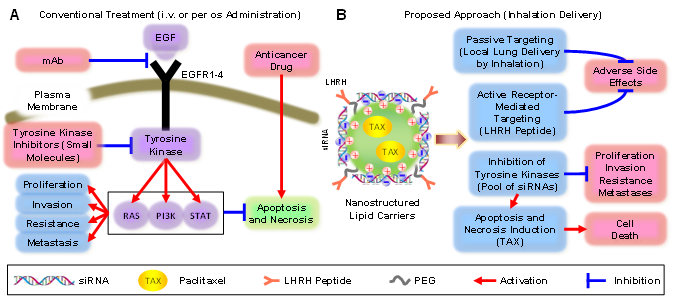
Invention Summary:
Non-Small Cell Lung Carcinoma (NSCLC) is the most common type of lung cancer. Small molecule Tyrosine Kinase (TK) Inhibitors acting on the Epidermal Growth Factor Receptors (EGFRs) are standard therapies for patients with NSCLC harboring EGFR-TK inhibitor-sensitizing mutations. However, fewer than 10 % of patients with NSCLC benefit from this therapy. Moreover, this therapy can cause severe systemic toxicities and is ineffective in preventing non-canonical EGFR signaling.
Rutgers researchers have developed a novel multi-tier biotechnology treatment approach, where Nanostructured Lipid Carriers (NLCs) targeted to NSCLC cells by a synthetic Luteinizing Hormone-Releasing Hormone (LHRH) decapeptide is used for the simultaneous delivery of paclitaxel (TAX) and a pool of siRNAs targeted to the four major forms of EGFR-TKs. LHRH-NLC-siRNAs-TAX nanoparticles were synthesized, characterized and tested in vitro using human lung cancer cells with different sensitivities to gefitinib (inhibitor of EGFR) and in vivo on an orthotopic NSCLC mouse model.
The result shows a favorable organ distribution and superior anticancer effect when compared with treatment by a single drug, inhibitor of one EGFR-TK and non-targeted therapy.
Advantages:
- Enhancement of the treatment efficiency and limited/fewer adverse side effects resulted from a multifunctional NLC-based delivery system
- Able to target multiple EGFR-TKs using a pool of SiRNAs
Market Applications:
- Effective treatment of Non-Small Cell Lung Carcinoma in clinics
Intellectual Property & Development Status: Patent issued US 2022-0125728 A1. Available for licensing and/or research collaboration. For any business development and other collaborative partnerships contact: marketingbd@research.rutgers.edu
Publications: Theranostics (2019 Oct 22;9(26):8362-8376), “Strategy to enhance lung cancer treatment by five essential elements: inhalation delivery, nanotechnology, tumor-receptor targeting, chemo- and gene therapy."